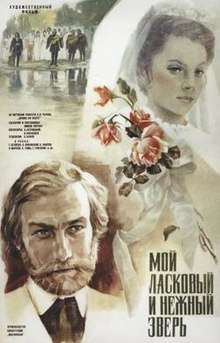A Hunting Accident
A Hunting Accident (Russian: Мой ласковый и нежный зверь, romanized: Moy laskovyy i nezhnyy zver, My Affectionate and Tender Beast) is a 1978 Soviet romantic drama directed by Emil Loteanu. It was entered into the 1978 Cannes Film Festival.[1] It is adapted from Anton Chekhov's The Shooting Party.
| A Hunting Accident | |
|---|---|
 Russian poster | |
| Directed by | Emil Loteanu |
| Written by | Emil Loteanu Anton Chekhov |
| Starring | Galina Belyayeva Oleg Yankovskiy Kirill Lavrov Leonid Markov Svetlana Toma Grigore Grigoriu |
| Music by | Eugen Doga |
| Cinematography | Anatoli Petritsky |
| Edited by | L. Knyazev |
Production company | |
Release date |
|
Running time | 105 minutes |
| Country | Soviet Union |
| Language | Russian |
Plot
The film is set in the end of the 19th century and takes place at an aristocratic estate in the forests of central Russia. The daughter of a forester, Olga Skvortsova (Galina Belyayeva) is a beautiful nineteen-year-old woman. Three middle-aged men who live in the manor and the surrounding area fall in love with her: a 50-year-old gloomy widower Urbenin (Leonid Markov), an even more senior in age but youthful and lighthearted Count Karneev (Kirill Lavrov) and the stately, handsome, 40-year-old court investigator Kamyshev (Oleg Yankovsky). Olga wanting to escape poverty marries the nobleman Urbenin without love. On the day of her wedding she runs away from the celebration and declares her love to Kamyshev but refuses to leave with him. Kamyshev erupts with passion and jealousy and he secretly hopes that he can persuade Olga to be with him. She is under the impression that Kamyshev is rich and that with him she will be able to break out of poverty but soon finds out in what lowly conditions her lover lives. After this disappointment she becomes a mistress of the jovial Count Karneev, while her lawful husband Urbenin slowly ruins himself with drink and degenerates in the city.
During the autumn hunt and picnic an intense argument happens between Olga and the fiercely jealous Kamyshev and after a few minutes under mysterious circumstances Olga receives a gunshot wound in the depths of the forest thicket. The young woman dies a few days later from severe blood loss without informing the investigators who attacked her at the shooting party. Her husband Urbenin is the main suspect and he is exiled to Siberia and four years later sentenced to death. Tormented by pangs of conscience Kamyshev writes a story about the dramatic events and submits it for publication in a journal. After reading the story by Kamyshev it becomes clear to the astute publisher (Olegar Fedoro) who was Olga's real murderer.
Music
The wedding waltz composed for the film by Eugen Doga became famous worldwide. Ronald Reagan called it "the waltz of the century" when he visited Moscow.[2][3] American figure skater Sasha Cohen skated to the waltz in her short program at the 2002 Winter Olympics.[4] The music was used at the opening ceremony of the 2014 Olympic Games in Sochi.[5] In 2014, the waltz was chosen by UNESCO as the fourth musical masterpiece of the 20th century.[6][7][8]
Cast
- Galina Belyayeva as Olga (as Galya Belyayeva)
- Oleg Yankovsky as Kamyshev
- Kirill Lavrov as Count Karneyev
- Leonid Markov as Urbenin
- Svetlana Toma as Gypsy Tina
- Grigore Grigoriu (as Grigori Grigoriu) as Polychrony Arkadyevich Kalidis
- Vasili Simchich
- Olegar Fedoro as Publisher (as Oleg Fedorov)
- Vadim Vilsky as Doctor
- Anna Petrova (as Anya Petrova)
- Vladimir Matveyev (as Volodya Matveyev)
- Valeri Sokoloverov
See also
- Summer Storm (1944)
References
- "Festival de Cannes: A Hunting Accident". festival-cannes.com. Retrieved 21 May 2009.
- "Евгений Дога был любимым композитором президента США Рональда Рейгана" (in Russian). Komsomolskaya Pravda. Retrieved 23 September 2016.
- "Мой ласковый и нежный зверь: 5 знаменитых композиций Евгения Дога" (in Russian). Vechernaya Moskva. Archived from the original on 1 February 2018. Retrieved 23 September 2016.
- "Sasha COHEN: 2001/2002". International Skating Union. Archived from the original on 2 December 2001.
- The Complete Sochi 2014 Opening Ceremony (Motion picture). Olympics.1–46–50
- "UNESCO ruled: Eugen Doga's Waltz, the 4th music masterpiece of the XX-th century". Teleradio Moldova. Retrieved 23 September 2016.
- "UNESCO a decis: Valsul românului Eugen Doga, a patra capodoperă muzicală a secolului XX" (in Romanian). Active News. Retrieved 23 September 2016.
- "ЮНЕСКО признала вальс фильма "Мой ласковый и нежный зверь" шедевром XX века" (in Russian). BELTA – Novosti Belorusi. Retrieved 23 September 2016.